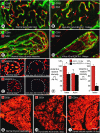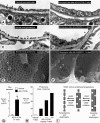Mechanisms of adverse effects of anti-VEGF therapy for cancer
- PMID: 17519900
- PMCID: PMC2359962
- DOI: 10.1038/sj.bjc.6603813
Mechanisms of adverse effects of anti-VEGF therapy for cancer
Abstract
Advances in understanding the role of vascular endothelial growth factor (VEGF) in normal physiology are giving insight into the basis of adverse effects attributed to the use of VEGF inhibitors in clinical oncology. These effects are typically downstream consequences of suppression of cellular signalling pathways important in the regulation and maintenance of the microvasculature. Downregulation of these pathways in normal organs can lead to vascular disturbances and even regression of blood vessels, which could be intensified by concurrent pathological conditions. These changes are generally manageable and pose less risk than the tumours being treated, but they highlight the properties shared by tumour vessels and the vasculature of normal organs.
Figures



References
-
- Allen JA, Adlakha A, Bergethon PR (2006) Reversible posterior leukoencephalopathy syndrome after bevacizumab/FOLFIRI regimen for metastatic colon cancer. Arch Neurol 63: 1475–1478 - PubMed
-
- Baffert F, Le T, Sennino B, Thurston G, Kuo CJ, Hu-Lowe D, McDonald DM (2006a) Cellular changes in normal blood capillaries undergoing regression after inhibition of VEGF signaling. Am J Physiol Heart Circ Physiol 290: H547–H559 - PubMed
-
- Baffert F, Le T, Thurston G, McDonald DM (2006b) Angiopoietin-1 decreases plasma leakage by reducing number and size of endothelial gaps in venules. Am J Physiol Heart Circ Physiol 290: H107–H118 - PubMed
-
- Baffert F, Thurston G, Rochon-Duck M, Le T, Brekken R, McDonald DM (2004) Age-related changes in vascular endothelial growth factor dependency and angiopoietin-1-induced plasticity of adult blood vessels. Circ Res 94: 984–992 - PubMed
-
- Bates DO, Jones RO (2003) The role of vascular endothelial growth factor in wound healing. Int J Low Extrem Wounds 2: 107–120 - PubMed

